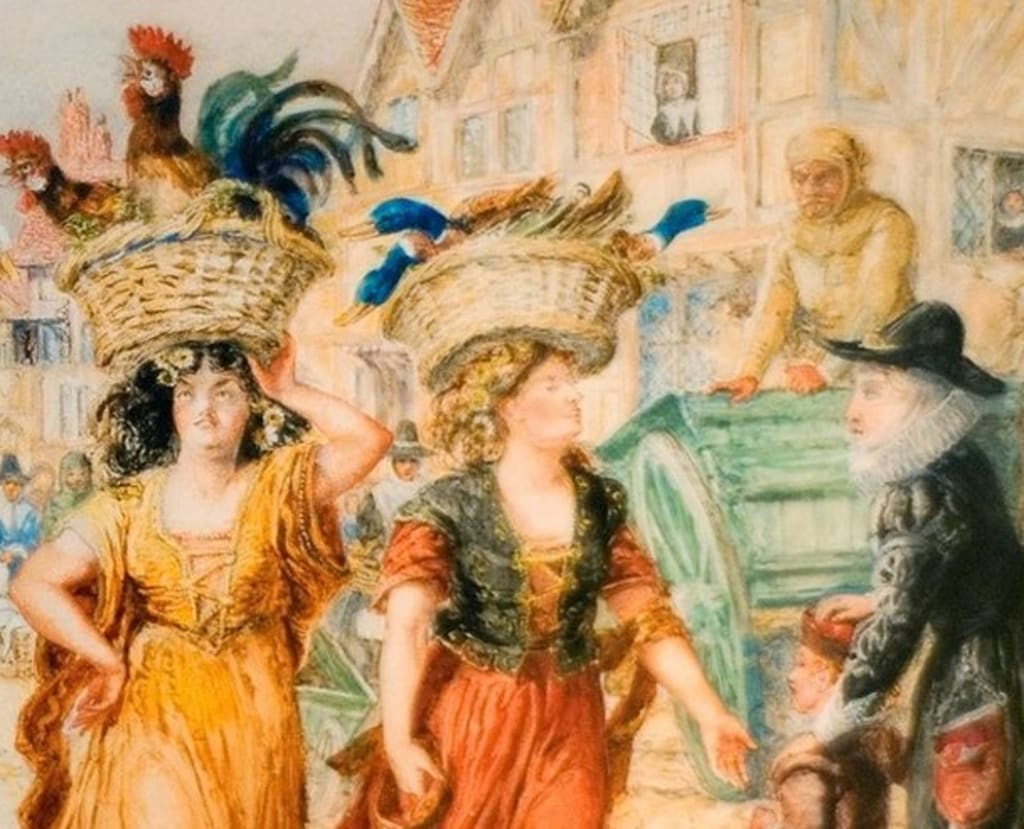Witches of the waterfront
A spell to catch a man

"Bless this day and make it fruitful. Bring me a man with gold coin, a hatful."
Jacinda's sing-song voice was a delight to hear on a bright spring morning, as the four women strutted through the streets on their way to the harbor market. Baskets on their heads, laden with their simple wares, the women teased and taunted the good people they passed. Many shook their heads at so brazen a procession, some mouthing "harlots" or even "witches" under their breath. Witches they may have been, harlots they were not.
"Good luck with that!" said one of her companions. The two other women laughed merrily at the enchanting song sung by their sister. The cockerels sang out their own accompaniment.
It was market day in Port Royal, the early morning sun promising another beautiful day.
"Plenty of time to find a man, my dearest heart," said another of the women. "First we must sell our wares or there will be no coin for any of us, gold, sliver or copper."
The women busied themselves setting out their stall on the harbor wall, awaiting the steady traffic of sailors, merchants, and all the people of the nearby town of Kingston. They knew it would be a day of many ships' arrivals, each disgorging bellyfulls of excited sailor men, ever eager to sample the wicked delights of the infamous Caribbean port.
As the first consignment of dubious humanity came tottering down the gangway from the ship above, so Jacinda and her three companions prepared themselves for the onslaught. Ever smiling and encouraging, they plied their wares, while laughing off the crude and clumsy advances of the poor wretches who had not benefitted from female society in many moons. They hardly knew how to speak to a woman, let alone woo her.
"How about a kiss for a sea salt?" one might say but more likely it would be "how much for a feel of those mangoes?" or "Come with me for a romp behind the storehouse?" Such a crude hail was brushed aside with a laugh or an "Away with ye!" Any attempt at a grope or a grab was likely to be repaid with a slap to the face, or a stamp on the foot, and a lusty shove, for these ladies knew how to look after themselves. And they knew that this tide of eager manhood would soon pass them on its way into the town. The women of the bawdy houses where the sailors would inevitably end their day would know how to handle them and to satisfy their baser needs.
At the end of a long morning's procession of newcomers, there was a late arrival.
"Good morning dear ladies, and how does the day find you?"
He was a huge and powerful looking man but with a broad and disarming smile that Jacinda was quick to notice. His skin was the color of mahogany and shone with the health that his seagoing life brought him. He had a
I saw, I saw that winsome smile,
The mouth that did my heart beguile
(William Bell Scott , The Witch's Ballad)
young lad in tow, whose complexion was, by contrast, as pale as pale could be, beneath a flaking layer of bright sunburn and freckles. And poking out from a battered tricorn were curling locks the color of bright, yellow straw.
Though all four women were looking at the new arrivals, Jacinda was quick to answer.
"Well we are all in the best of health on this fine day, and all the better to meet a gentleman such as yourself. And who, pray, kind sir, is the young man who accompanies you."
"Why, miss, this is my one and only son Horatio. And I, the father, am Cedric de Haviland, seafarer. At your service, ladies."
The boy who, judging by appearance, could hardly have been sired by the man who stood beside him, nevertheless stood closer, allowing de Haviland to place a proprietorial arm about his shoulder.
"And..." he continued, "I am going to show him the sights around this great place yonder," gesturing toward the nearby new town of Kingston.
At this, the boy Horatio cast his eyes down in quiet bashfulness, as each of the women other than Jacinda laughed, cheerily. Jacinda merely clucked and shook her had that one so young should be exposed to such iniquities.
After exchanging a few more brief pleasantries the two men were on their way, each bowing their courteous goodbyes to the four port-side stall keepers. The boy holding his hat to his chest as he did so, his fair locks all a tumbling down in disarray.
Later that afternoon, as the four women returned to their humble home in the breathless valley in the back country not far from the harbor, the talk was all of the gentlemanly sailor Cedric and his 'son' Horatio.
"Why, Jacinda, did you not notice the way Monsieur de Haviland looked at you?" and "Why did you not ask him to visit us here in our cosy abode?"
"When a lady meets a gentleman for the first time, it does not do to be over-eager." They all laughed at that. "Besides, he's a sailor man and will be off on his travels with the turn of the tide."
All talk of men and of tides was forgotten as the sisters bathed in the cool water of the stream and then supped on rice and peas and some salt fish brought back from the market. Taking their meal in the open air, they were soon able to look up to a glorious full moon. As the beauteous sliver disk rose high in the sky, they joined hands and formed a simple circle, with each of them marking one of the four points of the compass.
Raising their hands and faces to the goddess they chanted in unison:
"Blessed Mother Selene, hear us. Shine your eternal light upon us. Bring us health and wealth and serenity. Guard this, your sisterhood, from inner enmity."
"... and bring Jacinda the man she longs for." This last chant from the woman who stood opposite Jacinda. Each of the women laughed and fell into a warm embrace. As the evening wore on, so they each retired to their simple single-room dwelling, which was little more than a mud hut, taking their refuge upon their respective straw pallets. They each slept with little to cover their naked bodies, as the night remained hot and humid, with hardly a breath of breeze.
The next morning, Jacinda left at the earliest hint of dawn, on the pretext of a visit to one of the factors who plied his trade from a waterside storehouse. She was hoping to chance upon the gallant Monsieur de Haviland before he should set sail for the seven seas.
Instead of de Haviland, who should Jacinda happen across but the gentleman's, son, the fair-skinned lad Horatio. He was sitting upon the sea wall, the watery streaks on his face all too evident. On recognising Jacinda he cried out.
"Oh, oh, kind miss, what am I to do?"
"Whatever is wrong, dear lad."
"Father is gone. For he was found drunk in the street and was taken back on board by the mate and two of the hands. He bade me fetch his possessions where he left them at the inn but, when I returned, the ship had weighed and warped out, and there was not a shore boat in sight to take me out. They wouldn't wait for a mere ship's boy and father was most likely incapacitated, if not clapped in irons until he sobered up."
Jacinda listened to the boy's tale with quiet patience. She then took him in her arms as he rested his head upon her shoulder and gave out in fits of sobbing.
"There, there, dear. Don't you fret so. You will come back to stay with me and my three sisters and we will await the return of your father together."
The boy took little persuading and, after sharing a breakfast of papaya, the two of them walked back to the home Jacinda share with her three sisters.
As she approached the hut, she called out.
"Come see, my beloved sisters, what I have found."
"What is it sister?" they replied as one.
"See, I have found a little man. And look," she said, lifting the boy's tricorn hat off of his head and indicating the glorious blonde locks, "he has brought with him a hat full of gold."
The three other women laughed and welcomed the lad into their home and their protective circle, where the boy remained. He found himself the most beloved, fussed over and well-fed youth in all the island. Not to mention becoming an enthusiastic student of the mystical and magical arts practiced by his four adoptive aunts. Did his father ever return? Well that, my friends, is another story.
About the Creator
Raymond G. Taylor
Author based in Kent, England. A writer of fictional short stories in a wide range of genres, he has been a non-fiction writer since the 1980s. Non-fiction subjects include art, history, technology, business, law, and the human condition.






Comments (1)
love this